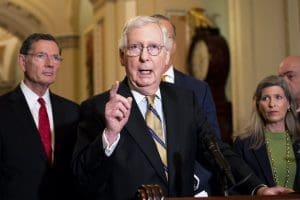McConnell says GOP won't address the debt it helped accumulate
Suspension of the ceiling on borrowing by the Treasury to pay government debt expires on July 31.

Senate Minority Leader Mitch McConnell said on Tuesday that in order to pass legislation to raise the cap on the amount of money the U.S. government can borrow to pay back its existing debts, the Democratic majorities in Congress would have to use the budget reconciliation process, because no Republican was likely to vote for it.
“I can’t imagine there will be a single Republican voting to raise the debt ceiling after what we’ve been experiencing,” the Kentucky Republican senator told Punchbowl News. “I can’t imagine a single Republican in this environment that we’re in now — this free-for-all for taxes and spending — to vote to raise the debt limit. I think the answer is they need to put it in the reconciliation bill.”
According to the U.S. Department of the Treasury’s website, the debt ceiling is an upper limit on “the total amount of money that the United States government is authorized to borrow to meet its existing legal obligations, including Social Security and Medicare benefits, military salaries, interest on the national debt, tax refunds, and other payments.
“The debt limit does not authorize new spending commitments,” it notes. “It simply allows the government to finance existing legal obligations that Congresses and presidents of both parties have made in the past.”
In other words, raising — or suspending — the debt ceiling is a necessary step for the Treasury to avoid defaulting on the nation’s existing obligations: the spending Congress has authorized and the interest on the money the Treasury has borrowed to pay for it.
When Donald Trump was in the White House in 2019, a number of GOP senators, including then-Majority Leader McConnell, joined almost every Democrat in voting to pass a budget agreement that suspended the debt limit entirely for the remainder of his term, allowing the government to borrow freely to pay its debt and avoiding a default.
Trump was among those who noted that the expiration of the suspension would fall after the 2020 presidential election, avoiding a budget fight in the lead-up to November. That two-year suspension is set to expire on July 31.
“I am confident it is not exactly the legislation that either side of the aisle would have written if one party held the White House, the House, and had 60 votes in the Senate,” McConnell argued at the time. “That’s divided government. But I am equally confident that this is a deal that every one of my colleagues should support.”
McConnell and his caucus also played a big role in bringing the national debt to its current levels. Nearly one-third of the current $28.5 trillion U.S. national debt was added during the Trump administration, when Republicans controlled the Senate.
In 2017, they passed — without a single Democratic vote in favor — Trump’s 2017 Tax Cuts and Jobs Act, which massively reduced tax revenue from big corporations and very wealthy Americans. That legislation increased the debt by an estimated $1 trillion to $2 trillion over a decade.
Last year, Republicans and Democrats came together to pass a number of COVID-19 pandemic relief packages containing more than $3 trillion in new spending. McConnell championed and voted for the emergency bills.
But now that the time has come to ensure the money is there to pay for it all, McConnell is demanding that Democrats do so by themselves — through a process he continues to decry.
In February, before Democrats passed President Joe Biden’s $1.9 trillion American Rescue Plan without a single Republican vote in favor, McConnell criticized the majority for using budget reconciliation to pass a bill his party opposed. “They’ve chosen a totally partisan path,” he said. “That’s unfortunate.”
He objected on July 13 to Democrats attempting “to force through another partisan reconciliation spending bill.”
And on July 15, McConnell railed against Democratic plans to use the reconciliation process again to pass investments in clean energy, health care, child care, and climate change infrastructure, mocking it as a “budget-busting socialist package” and a “socialist borrowing, taxing, and spending spree.”
Published with permission of The American Independent Foundation.
Recommended

Biden calls for expanded child tax credit, taxes on wealthy in $7.2 trillion budget plan
President Joe Biden released his budget request for the upcoming fiscal year Monday, calling on Congress to stick to the spending agreement brokered last year and to revamp tax laws so that the “wealthy pay their fair share.”
By Jennifer Shutt, States Newsroom - March 11, 2024
December jobs report: Wages up, hiring steady as job market ends year strong
Friday’s jobs data showed a strong, resilient U.S. labor market with wages outpacing inflation — welcome news for Americans hoping to have more purchasing power in 2024.
By Casey Quinlan - January 05, 2024
Biden’s infrastructure law is boosting Nevada’s economy. Sam Brown opposed it.
The Nevada Republican U.S. Senate hopeful also spoke out against a rail project projected to create thousands of union jobs
By Jesse Valentine - November 15, 2023









































































